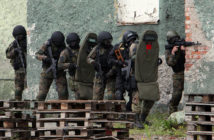The young Maghreb fighters in Syria and Mali see themselves as freedom fighters. For citizens in the war zones, they are al-Qaeda terrorists.
By Mawassi Lahcen in Casablanca and Said Zentari in Tangier for Magharebia![[AFP/Aamir Quereshi] Rebels take position in the north-western Syrian town of Jisr al-Shughur.](http://magharebia.com/cocoon/awi/images/2013/03/08/130308ReportagePhoto1.jpg)
[AFP/Aamir Quereshi] Rebels take position in the north-western Syrian town of Jisr al-Shughur.
Al-Qaeda’s latest marketing ploy targets Maghreb youth. After suffering setbacks in other countries, the terror organisation is using Mali and Syria to boost its ranks.
From recruiting points in Morocco, Tunisia and Algeria, young people are being trained in northern Mali, armed in Libya and dispatched to Syria to join a raging war against al-Assad’s regime.
But for many Syrians, these foreigners are fighting a war not to liberate them, but to impose an agenda alien to their own democratic aspirations.
The new foot soldiers from the Maghreb have gathered behind al-Qaeda propaganda campaign aimed at transforming the Republic of Syria into another Iraq and turning the Republic of Mali into a new Afghanistan.
Al-Qaeda started looking at Syria as a substitute to establish an Islamist emirate in the heart of the Middle East. Through local affiliate Jabhat al-Nusra li ahl al-Sham (JAN), al-Qaeda was able to exploit international sympathy for the Syrian people to recruit new fighters.
But as former Libyan Islamic Fighting Group (LIFG) leaderNoman Benotman, points out, the vast majority of militants in Syria “do not view the conflict from an ideological perspective; they are only fighting to get rid of the al-Assad regime”.
“Look at what they did in Yemen: they came in under the name of Ansar al-Sharia. Look at what happened in Mali, where al-Qaeda in the Islamic Maghreb exists but behind a different facade and through other alliances,” Benotman says.
“Al-Qaeda applied the same logic in Syria with Jabhat al-Nusra. It wants to use the current conflict as an incubation stage where it can work on building an organisation,” Benotman adds.
According to Abdullah al-Rami, a Moroccan researcher who specialises in Islamist groups, satellite channels helped speed the mobilisation by devoting extensive airtime to the humanitarian catastrophe in Syria. “In the spirit of general solidarity with the Syrian people, an appropriate environment was created to recruit fighters, whether they were civilians or jihadists,” he said.
After hearing the call for foreign jihad from the mosque, TV or the internet, “young people from different Maghreb countries are fighting alongside these organised groups in Syria”, confirmed Lies Boukraa, who heads the Algiers-based African Centre for Studies and Research on Terrorism (CAERT).
And they are dying there. As many as 132 Tunisian nationals were killed around Aleppo on February 14th. According to Express FM, most of those who died in the northern Syria city were from Sidi Bouzid, the birthplace of the Tunisian revolution.
Even young Maghreb women are being drawn into the conflict in the wake of the recent fatwa from a Wahhabi cleric. Saudi Sheikh Mohamed al-Arifi allegedly said it was permissible for Islamist fighters marry for a few hours with girls as young as 14. While al-Arifi has denied being behind the fatwa, it has still been used to take advantage of young women.
But these young Maghreb fighters in Syria and their temporary brides, who thought they were helping liberate the Syrian people from an oppressive regime, may be in for a rude awakening. They are allying themselves with what many Syrians see as unwelcome interlopers.
“Problems will arise in Syria between the jihadist groups that seek to establish an Islamist regime and the secular opposition, exactly like what happened in other countries where secular regimes were toppled in Maghreb and elsewhere,” Algerian analyst Boukraa said.
Jabhat al-Nusra’s objectives are no different from those of al-Qaeda: namely, to establish full Islamist rule in the form of emirates spread across Arab and Islamic regions, ultimately united under the banner of one Islamist state.
But the radical group “overestimated the religious loyalty of the Syrian people, just as [al-Qaeda in Iraq] did in the 2000s,” Noman Benotman said in a recent report for his Quilliam Foundation. “Syrian culture is not naturally conducive to Islamist governance, given the religious pluralism and history of relative religious freedom and tolerance”.
While Jabhat al-Nusra has presented itself as an opposition force fighting the regime, its long-term goal of imposing extremist Islamist rule has become more apparent, from forced hijabs on children under 10 to Sharia punishments and attacks on places of worship.
“Syrian society does not accept those extremist ideas and has historically rejected them as alien to its fabric, and it will oppose them in the future as it does now,” said Abdulbaset Sieda of the National Coalition for Syrian Revolutionary and Opposition Forces.
This has all been seen before, Iraqis are quick to point out.
“They are terrorists and different from the other revolutionaries,” acting Iraqi Defence Minister Saadoun al-Dulaimi told Mawtini. “JAN is turning its attacks on the people, just as al-Qaeda-affiliated terrorist groups did in Iraq,” he said, noting the destruction of statues, archaeological sites and sacred shrines.
“Al-Qaeda’s ideology and style are the same, anytime, anywhere, whether in Iraq, Afghanistan or Syria,” al-Dulaimi said.
The Syrian people “must not allow anyone to take away their freedom, because allowing terrorist groups to proliferate there is a repeat of the Iraqi scenario”, he added.
Mali propaganda campaign brings new recruits
In Mali, al-Qaeda chose a different tack. The group mounted a propaganda campaign to characterise a military intervention to restore the country’s territorial integrity as a crusade against Muslims by the West.
However, as soon as they began controlling large areas in the north of Mali, groups hovering in the orbit of al-Qaeda began applying Sharia law. They started with bans on football, the shaving of beards, television and smoking, and moved on to stonings, amputations, floggings and the desecration of holy shrines and historical monuments.
Once again, the internet and satellite channels spread extremist messages to prod young people toward jihad in northern Mali.
Recruiting networks hunted likely candidates in poor neighbourhoods and outside mosques. They then sent them through southern Tunisia, Algeria and Morocco, and across Mauritania and Libya, to camps in Mali.
More than 20 young Moroccans recently crossed into Mali to join al-Qaeda in the Islamic Maghreb (AQIM), Moroccan security forces learned after dismantling a terror recruitment cell.
Al-Qaeda presents several options for Maghreb jihadists through its affiliates in the Sahel and Sahara. But its real goal is Syria.
During the past two years, al-Qaeda theoreticians crafted a new ideology to make Syria a launch pad for global jihad.
Al-Qaeda is trying to undermine the new moderate Islamic movements that arose after the Arab Spring by labelling them as closet secularists, while presenting itself and its affiliates as the true adherents to Islamic law, says Moroccan researcher Driss Alqsouri.
Syria today is integral to al-Qaeda’s long-term goal of recruiting an international array of fighters, including those from Maghreb countries.
But for Syrians fighting for a country free of al-Assad, the potential of tyrannical state led by foreign extremists is just as bad.
“We’ll fight them on day two after al-Assad falls,” one rebel commander told The Guardianearlier this year. “Until then we will no longer work with them.”
Another rebel told the paper about a surprise encounter with a Tunisian al-Qaeda supporter in Syria, warning of the dangers of foreign fighters.
“He was a Tunisian,” the Syrian rebel commander said. “And he said he brought a message on behalf of Ayman al-Zawahiri. He asked us to join him and said there would be benefits for us if we did. He asked me to pledge a bayaa to al-Qaeda. I said no. This is what we all must do. If we continue with them, the Syria of our dreams will instead haunt our children in their nightmares.”




![[File] Relatives of 16-year-old Tunisian girl posted a video online saying she was kidnapped by jihadists and taken to Syria.](http://magharebia.com/cocoon/awi/images/2013/03/08/130308ReportagePhoto2.jpg)
![[AFP/Ali Kaya] Chadian troop capture Islamist militants on March 3rd after violent clashes in Mali's Ifoghas Mountains.](http://magharebia.com/cocoon/awi/images/2013/03/08/130308ReportagePhoto3.jpg)


